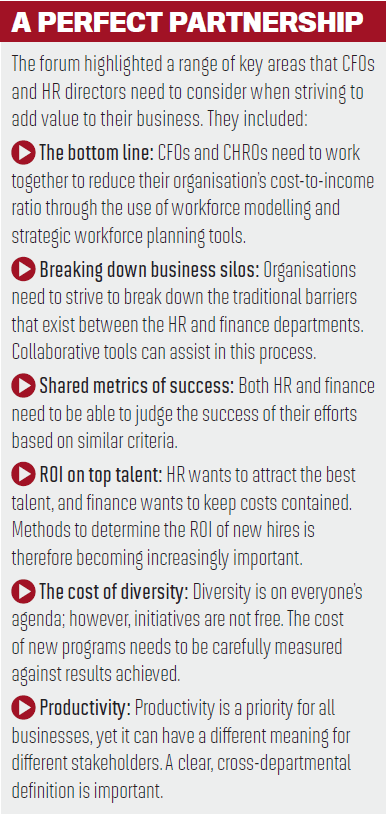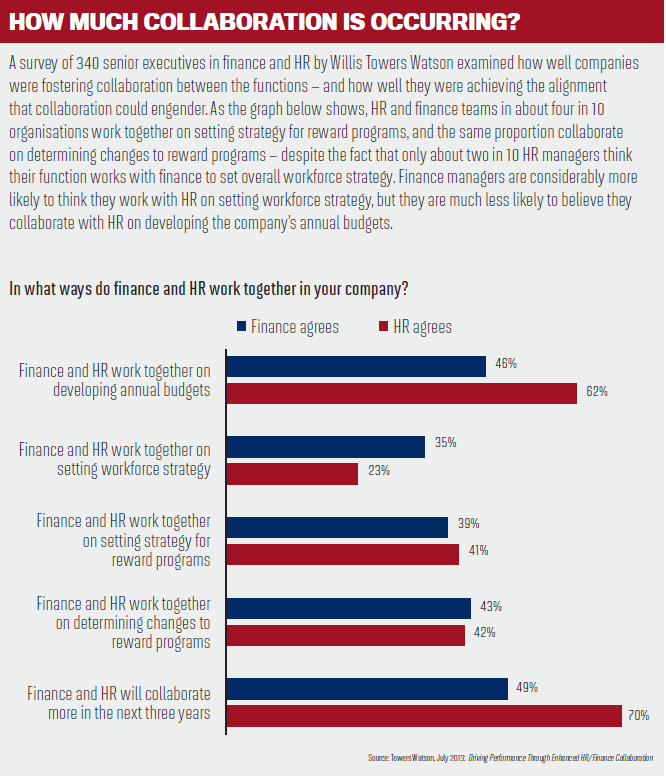No partnership could potentially have a more immediate impact on business performance than CFOs and CHROs joining forces to work collaboratively. Yet HR departments and the CFO’s office have historically not worked as collaborators.
The tide, however, is shifting in disruptive companies where the two worlds of HR and finance have begun to converge, with immediate results. At the start of a new year and with businesses looking ahead to 2020 and beyond, companies are increasingly being tasked to rethink the traditional relationship between finance and HR – to think more broadly, be more strategic and commercial, and be less siloed in structure.
That’s according to a business forum hosted by Oracle Corporation in Sydney in October, at which a range of industry leaders were in agreement that aligning HR and finance could create immediate strategic value within an organisation.
 Bridging the divide
Bridging the divide
“As companies seek to grow, the two most likely obstacles they will face are a scarcity of funding and a shortage of human capital. To overcome these finance and talent bottlenecks, CEOs are increasingly coming to rely more heavily on both the CFO and the CHRO,” said Tim Jennings, chief research officer and research fellow at analyst firm Ovum.
He added that a growing number of organisations were turning to digital platforms that bridged the traditional divide between the two areas. “This allows both HR and financial decisions to be made based onthe most accurate data available within the organisation.”
Another forum speaker, Steve Vamos, non-executive director of Telstra and Fletcher Building Limited, and former CEO of
Microsoft ANZ and Ninemsn, said, “In 2016 and fast-changing times, to be truly successful business leaders have to shift their mindset. We need a mindset that is better suited to the world in which we operate and that strongly enables the potential that people and technology have to achieve great things.
“This is particularly important when you consider the relationship between HR and finance. While traditionally separate functions, organisations are finding closer collaboration between the two is generating big results. Working together, HR and finance can more effectively support new initiatives, explore new ideas and raise productivity. This changed mindset can deliver immediate results and, over time, help boost the business bottom line.”
Sue Kent, head of HR at consumer finance business Pepper Group, said, “While HR deals with people, and finance is focused on money, it is vital to build a solid bridge between the two areas. The biggest cost to our business is people, and so making sure we retain the very best and make them as productive as possible is important for future growth.
“It’s also important that no department has its own particular agenda. All must work together towards a shared goal. When information is presented to senior management, whether by one department or together, it needs to be consistent and accurate, and this can only come from having a platform that spans the business.”
Kent’s colleague, Cameron Small, Pepper’s group chief financial officer, argued that an important factor for his company’s success was having a flat management structure. “Communication and collaboration is key, particularly when it comes to the HR and finance departments. By understanding the priorities of each, informed decisions can be made that will help the organisation achieve its goals."
James Finlay, sales director, HCM, at Oracle in Australia, concluded, “No partnership has more potential for immediate impact on business performance than CHROs and CFOs working in collaboration to create crosspillar efficiencies, plan a workforce of the future through workforce modelling and strategic workforce planning, and increase efficiencies and productivity through changes to operating models.”

“While traditionally separate functions, organisations are finding closer collaboration between HR and finance is generating big results” - Steve Vamos



 Bridging the divide
Bridging the divide
